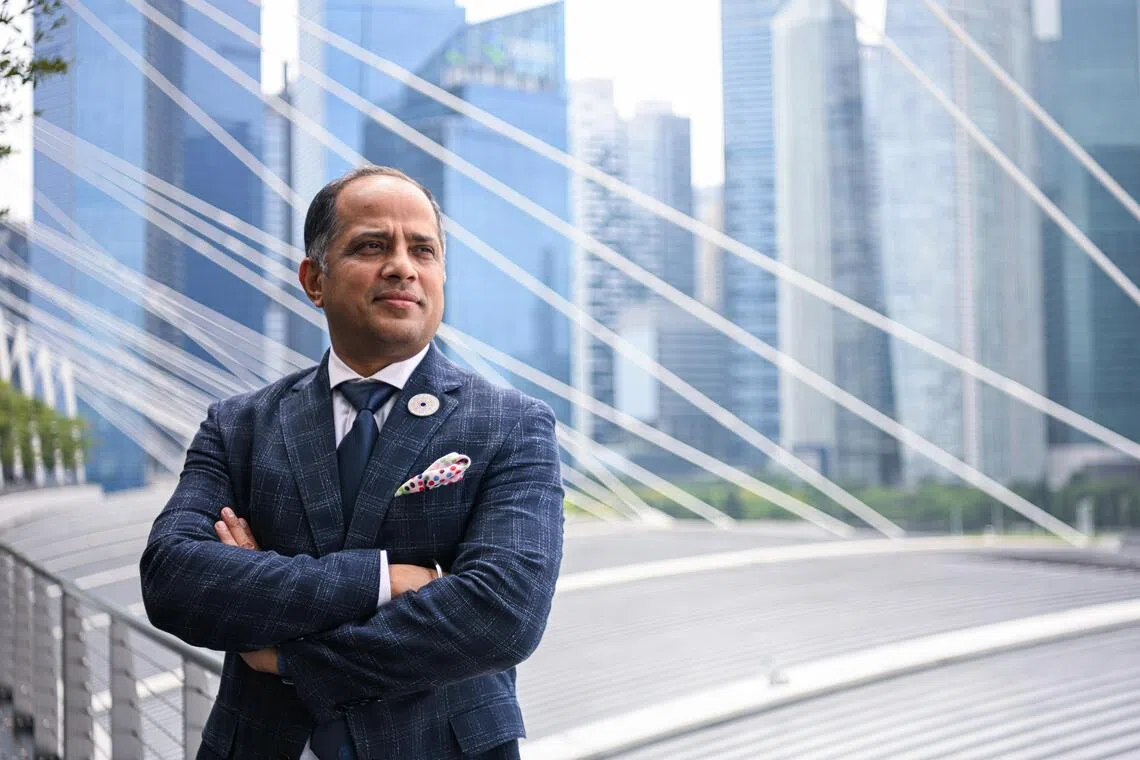CEO Insights
Weak storytelling could cost Singapore its fintech advantage: GFTN CEO
Sign up now: Get ST's newsletters delivered to your inbox

Mr Sopnendu Mohanty, group CEO of GFTN, said the inability of many Singapore fintech firms to market themselves to the world is holding the industry back from its next transformation.
ST PHOTO: AZMI ATHNI
- Singapore's fintech sector faces stagnation as first-generation segments mature; firms must embrace AI and quantum tech to grow. Sopnendu Mohanty warned of this.
- Many Singaporean fintechs struggle with global sales, hindering scalability due to poor understanding of international customer needs. This is a "cancer" to growth.
- Despite strengths like strong regulation, Singapore risks losing its hub status to competitors like the US
AI generated
SINGAPORE - Once a huge, thriving market, Singapore’s fintech industry is now at a crossroads and could find itself lagging behind other regional players if it does not reinvent itself.
Growth in first-generation fintech segments such as digital payments, wealthtech and insurtech is easing as these sectors mature. To unlock the next wave of opportunities, firms must move decisively into emerging technologies, such as artificial intelligence and quantum applications, and scale more aggressively beyond domestic markets.
These were the cautionary remarks made by Mr Sopnendu Mohanty, group chief executive of the Global Finance and Technology Network (GFTN), in an interview with The Straits Times ahead of the Singapore FinTech Festival, which took place from Nov 12 to 14.
GFTN, one of the festival’s organisers, is a non-profit set up by the Monetary Authority of Singapore (MAS) in 2024 to drive innovation and strengthen the resilience and efficiency of financial systems through global partnerships.
One key challenge for local fintech firms in scaling is that many struggle to understand customer needs beyond Singapore and articulate a compelling value proposition for those markets.
Many do not even attempt to visit the markets directly to identify business opportunities, choosing instead to let their products speak for themselves, said Mr Mohanty.
Describing this weakness as a “cancer” of the industry, he noted that 70 per cent to 80 per cent of failed fintech companies did not make it because they were lacking in this department.
“Selling is a very different skill set, which requires a lot of resilience and understanding of customer relations. It doesn’t matter how much you focus on product innovation or running a business, being able to sell is still crucial.
“If you can’t sell well, you will just delay your company’s death.”
Competition from global hubs
The difference that matters now is how well Singapore firms market themselves globally, a gap Mr Mohanty sees as the industry’s most pressing challenge and a key barrier to its next phase of growth, especially as other cities build their own fintech ecosystems.
In the last decade, Singapore has seen a huge boom in its fintech industry, and over 1,800 firms now operate here.
The Republic is also home to eight unicorns – three of them home-grown – and another 30 firms that have raised over US$100 million (S$130 million). Several of these unicorns, including global payments players Airwallex and Nium and digital bank TymeBank, are reportedly preparing for initial public offerings (IPOs) in 2026.
But they are unlikely to list on the Singapore Exchange, given the market’s limited size. Instead, these firms are expected to target Wall Street, where trading volumes are significantly higher, Mr Mohanty said.
Still, even if Singapore is not among the top destinations for fintech IPOs, its prospects remain solid as long as firms continue to anchor their headquarters here. The Singapore brand is still highly regarded, backed by strong regulation, deep capital access and a robust talent pool, he said.
“Because we have a development agenda, Singapore excels in allowing new ideas to be seeded and created. That’s our advantage.”
Yet these strengths may not be enough for the Republic to retain its position as a leading fintech hub, given how rapidly the industry is evolving.
“In the past, who would have thought about a unicorn in the Philippines, Thailand or Vietnam? Now you see unicorns coming from these countries at such a fast pace,” said Mr Mohanty.
“Our competitors are catching up with us, and there is very little difference between products around the world.”
Regulatory and compliance standards have also become much more standardised across South-east Asia in recent years.
“Every regulator has upped its game, and there will be no regulatory arbitrage between Singapore and any other country,” he said. “No regulator wants to run the risk of being labelled ‘easy’. Companies are not going to say that they are going to operate in the Philippines because regulators are relaxed – that era is over.”
The US has the potential to be a real threat to Singapore’s hub status, despite all the geopolitical uncertainties and unpredictability surrounding President Donald Trump.
As at October, fintech companies in the US have filed 13 applications for federal bank charters, the highest number since 2020, as the sector looks to capitalise on Mr Trump’s deregulatory stance and a more permissive regulatory climate.
Fintech funding declines
Mr Mohanty’s warnings carry added weight given his front-row seat to Singapore’s fintech boom over the past decade.
It was under his tenure as MAS’ chief fintech officer from 2015 to early 2025 that Singapore rose to prominence as a leading global hub.
A key catalyst was the Financial Sector Technology and Innovation (FSTI) scheme, launched by MAS in 2015 to build and support an ecosystem for innovation in the financial sector. MAS committed $225 million to the first iteration of the programme from 2015 to 2020 – though only half was used – benefiting over 200 financial institutions and fintech firms.
It was also around that time when equity funding for fintech in Singapore hit its peak.
Funding in the industry hit US$4.1 billion in 2022, an increase of 22 per cent from the total deal value in the previous year and the second highest since 2019, said a KPMG report.
But investments began to decline from 2023.
For the first nine months of 2025, Singapore attracted a total of just US$1.1 billion in fintech investments, 19 per cent lower than in the same period a year ago, according to GFTN’s report launched in October.
In the third quarter of 2025, investments were valued at US$198 million, 38 per cent lower than the previous year’s US$317 million. There were 16 disclosed deals recorded in the third quarter, compared with 37 a year ago.
The biggest deals included Grab’s US$60 million injection into digital bank GXS, a US$20 million early-stage round for blockchain firm aPriori, and US$19 million in Series A funding for digital assets company GRVT.
Payments, digital assets, blockchain and decentralised finance, and wealthtech made up the top fintech sectors in Singapore in 2025, the report said.
In contrast, investments for the first nine months of 2025 rose in India, Hong Kong and the US. The US recorded the sharpest increase, jumping 104 per cent from 2024 to US$83.2 billion, which also comprised 85 per cent of global value.
Mr Mohanty expects this slowdown to persist into 2026, but while the trend is somewhat concerning, he noted that it also reflects a market that is maturing and undergoing a natural correction. “The mature companies are no longer chasing private capital and are looking to the public market, while investors are also looking for an exit, which will most likely be an IPO.”
He added that early and mid-stage fintech companies in mature sectors that are still looking for growth capital could find themselves lagging further behind the bigger players.
Emerging hot spots for investment
Nevertheless, there are still opportunities for Singapore in emerging areas that are not yet tightly regulated, such as AI tokenisation and quantum computing, which are likely to become major investment hot spots in the coming years, he said.
MAS has already committed up to $150 million to its FSTI 3.0 scheme, aimed at helping smaller financial institutions adopt AI and data analytics.
Singapore also stands to benefit from more collaborations with other countries in these emerging areas.
On Nov 12, MAS signed a strategic partnership with British regulators to make it easier for AI-in-finance firms in Singapore and AI innovators in Britain to scale and deploy their solutions across both markets.
GFTN also announced on Nov 13 that it will partner Qatar Development Bank to establish a global finance and technology centre of excellence in Qatar. The initiative aims to boost regional collaboration, strengthen links with Asian markets and deepen ties with Singapore’s fintech ecosystem.
Looking ahead, Mr Mohanty said the last decade of fintech innovation is paving the way for a new paradigm shift, with AI set to permeate almost every aspect of daily life.
He expects AI to have one of the most profound impacts on the financial sector, noting that agentic AI – systems capable of making decisions and taking actions with minimal human input – will reshape financial advisory services, wealth management and even dispute resolution.
“Today I’ve stopped searching anything on Google, I just go to the AI agents. So AI will no longer be just a choice you have, but a habit – just like brushing your teeth.”
Correction note: In an earlier version of the story, we said that there are 1,300 fintech companies operating in Singapore, and Singapore attracted US$1 billion in fintech investments. These have been corrected.



